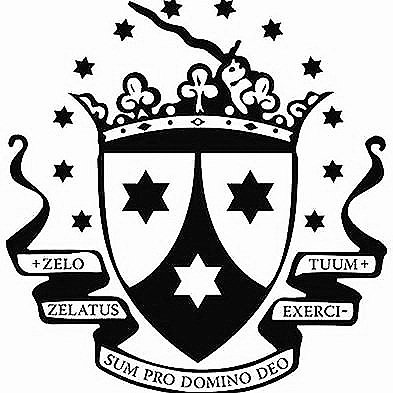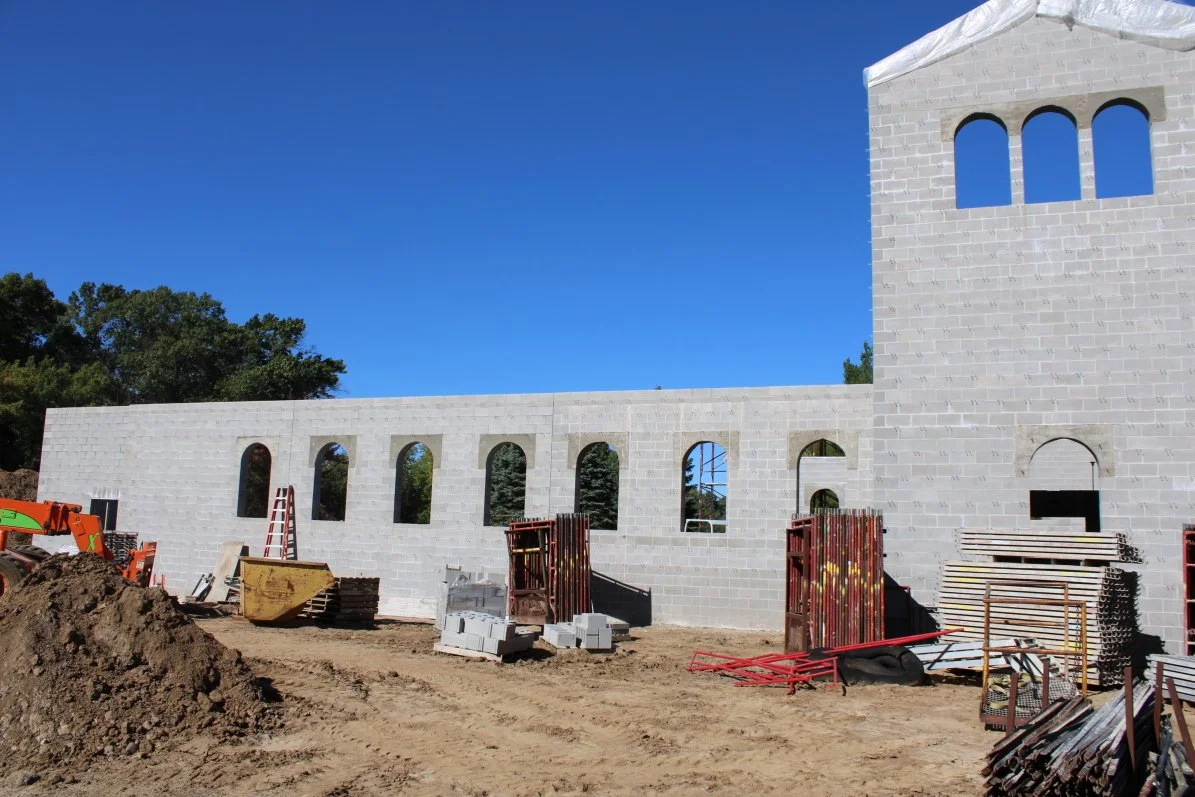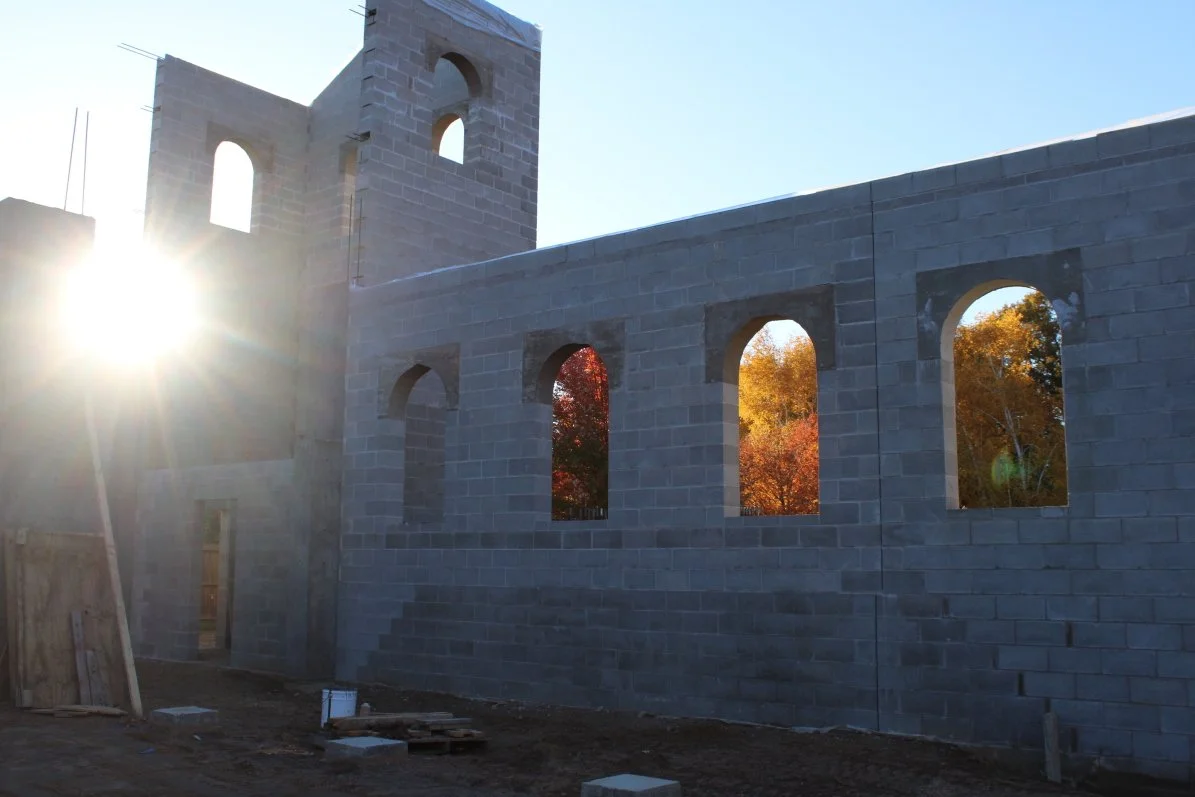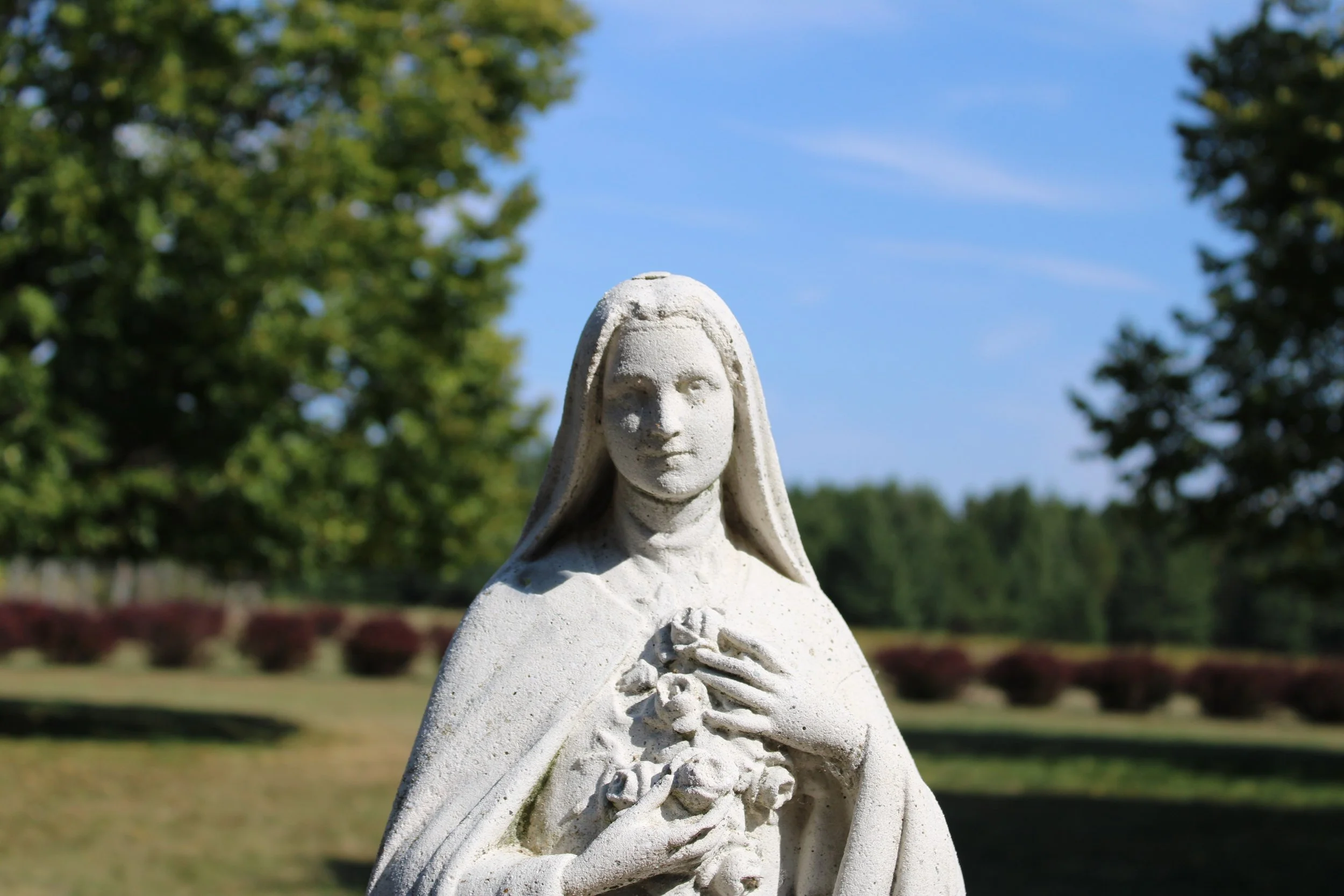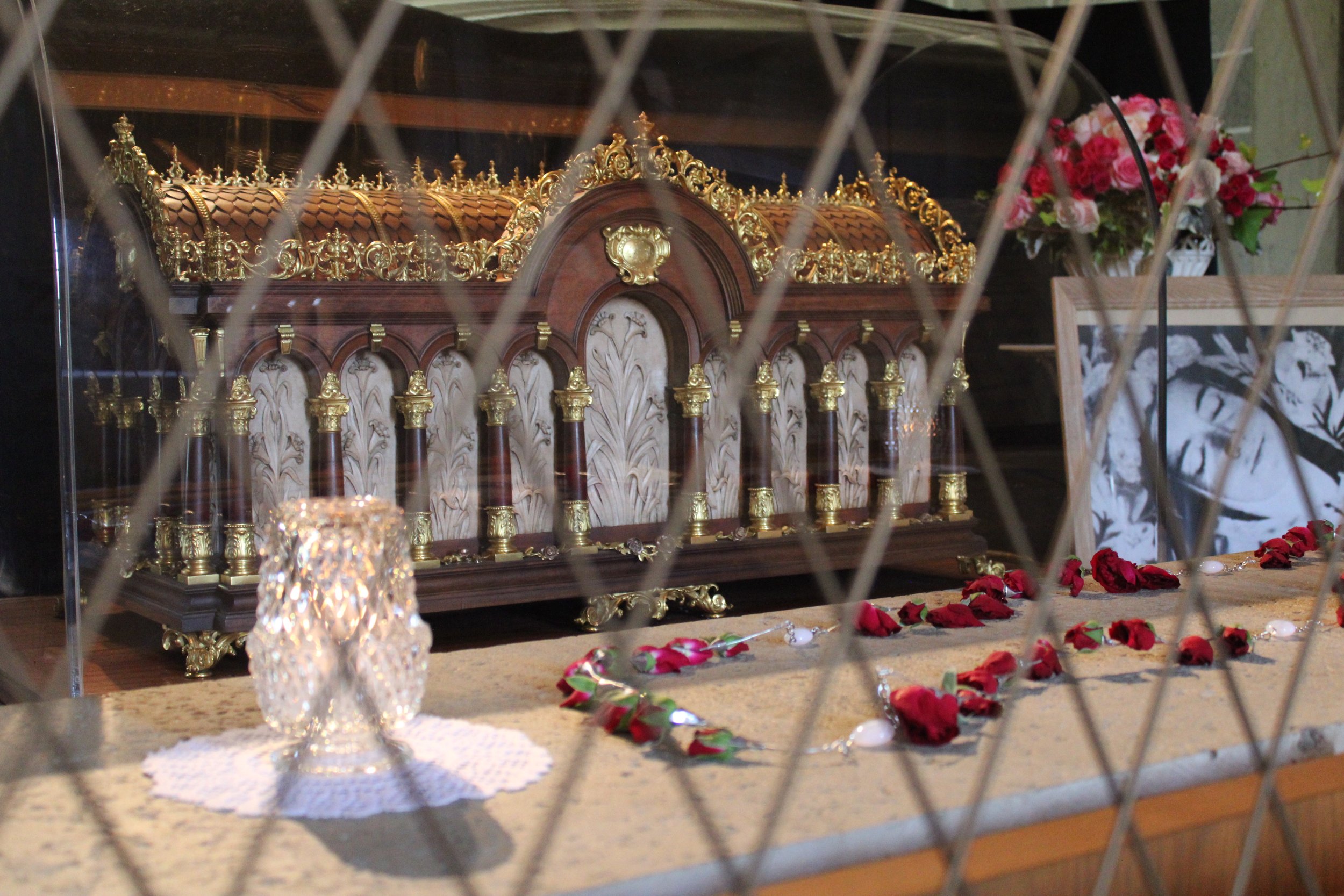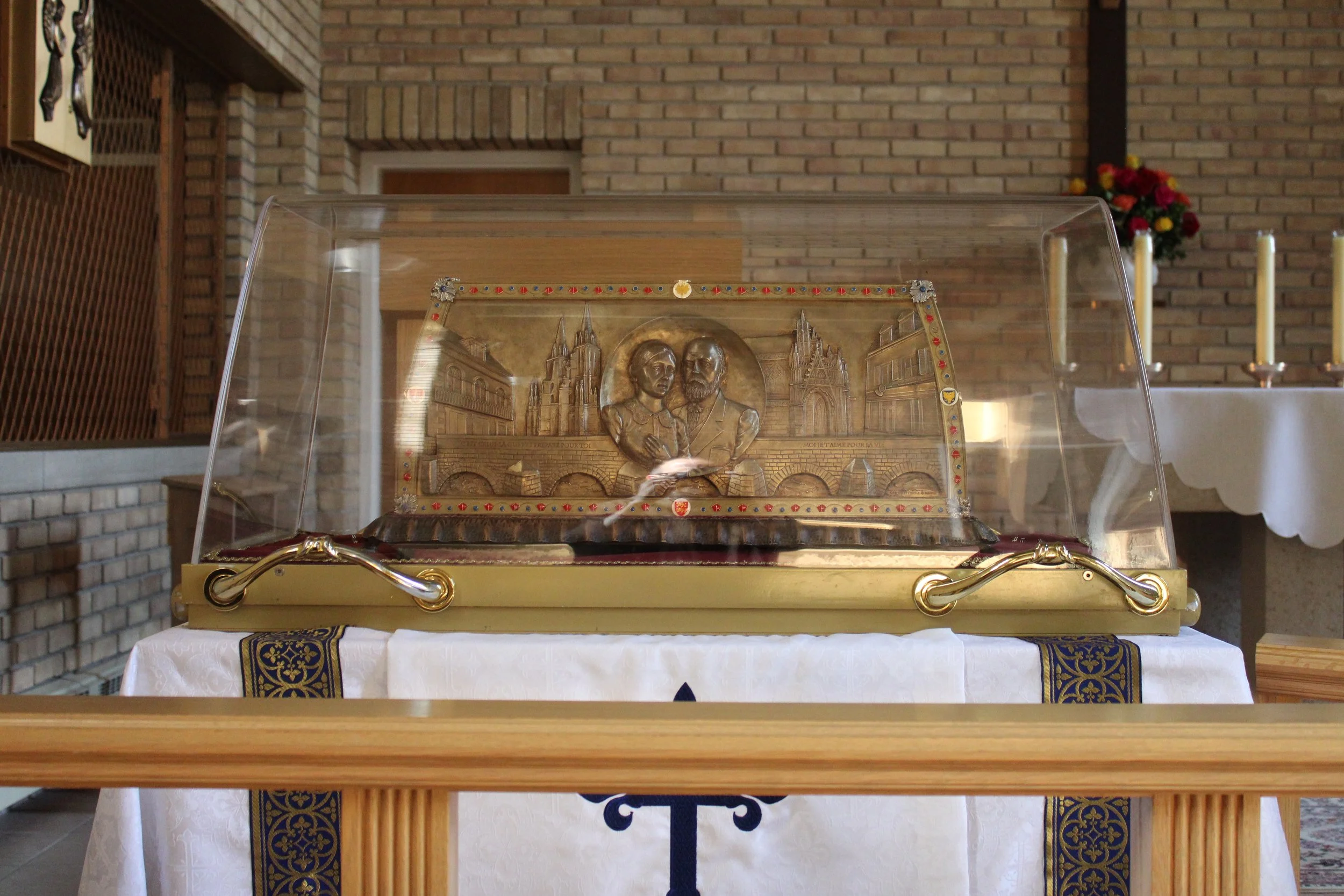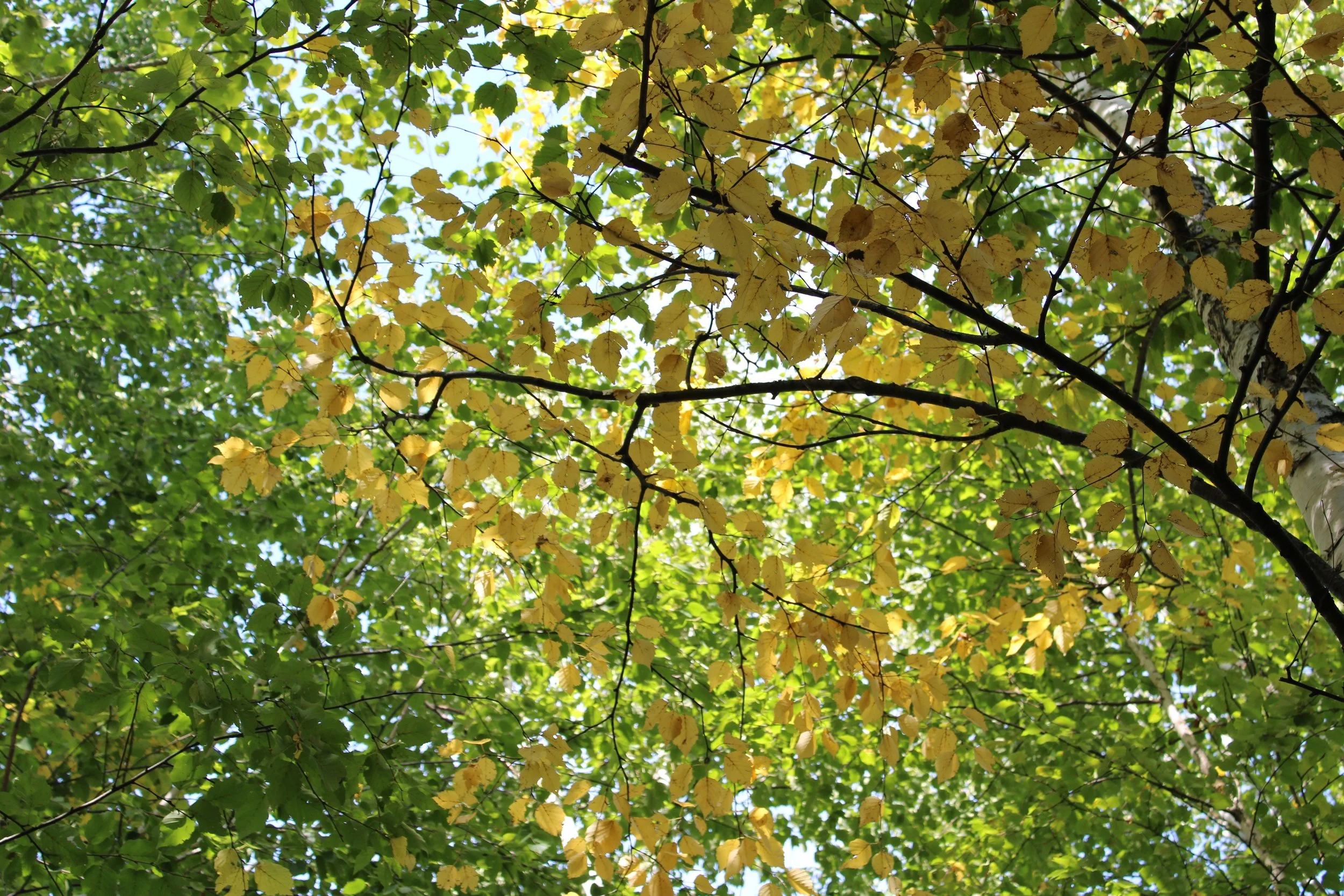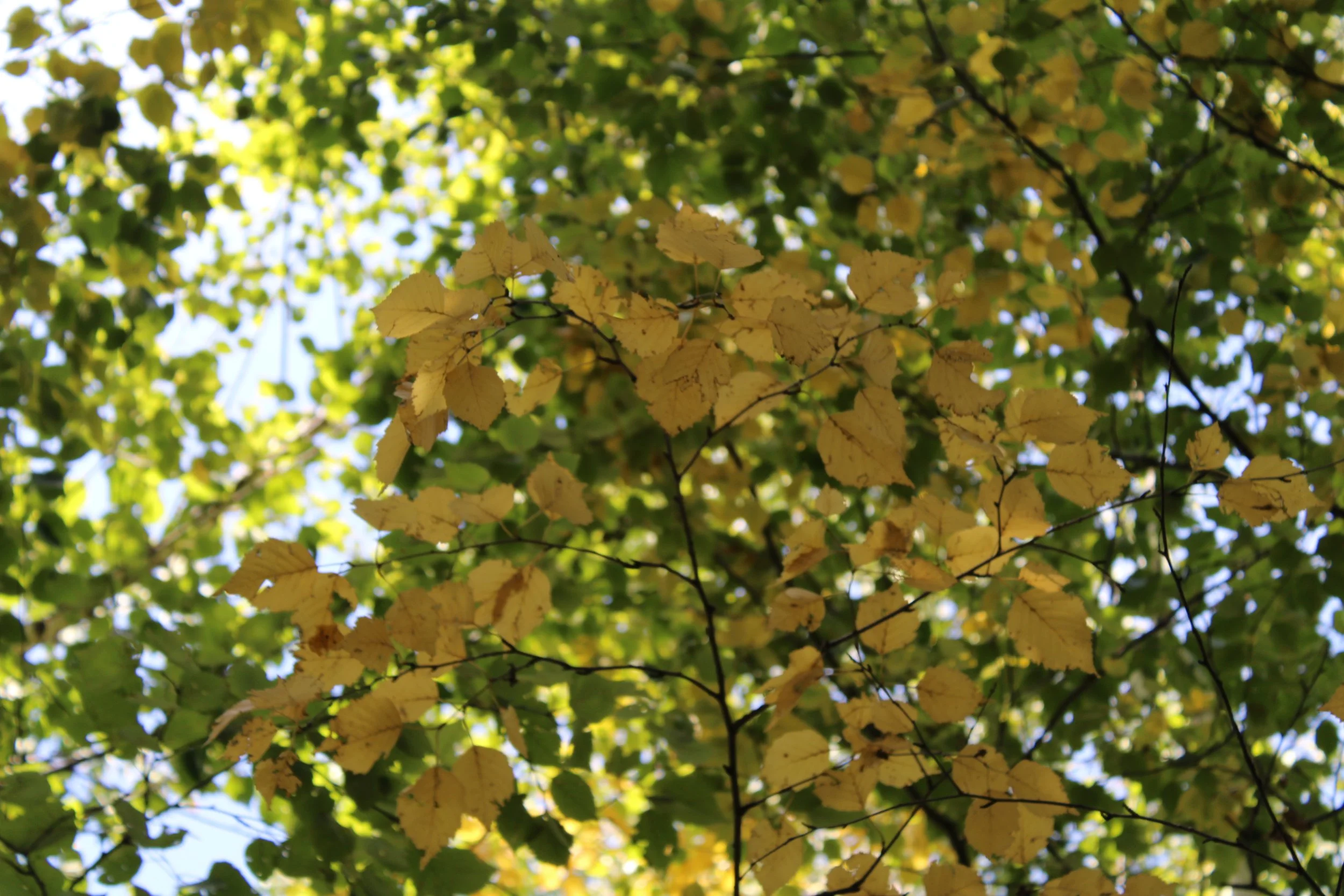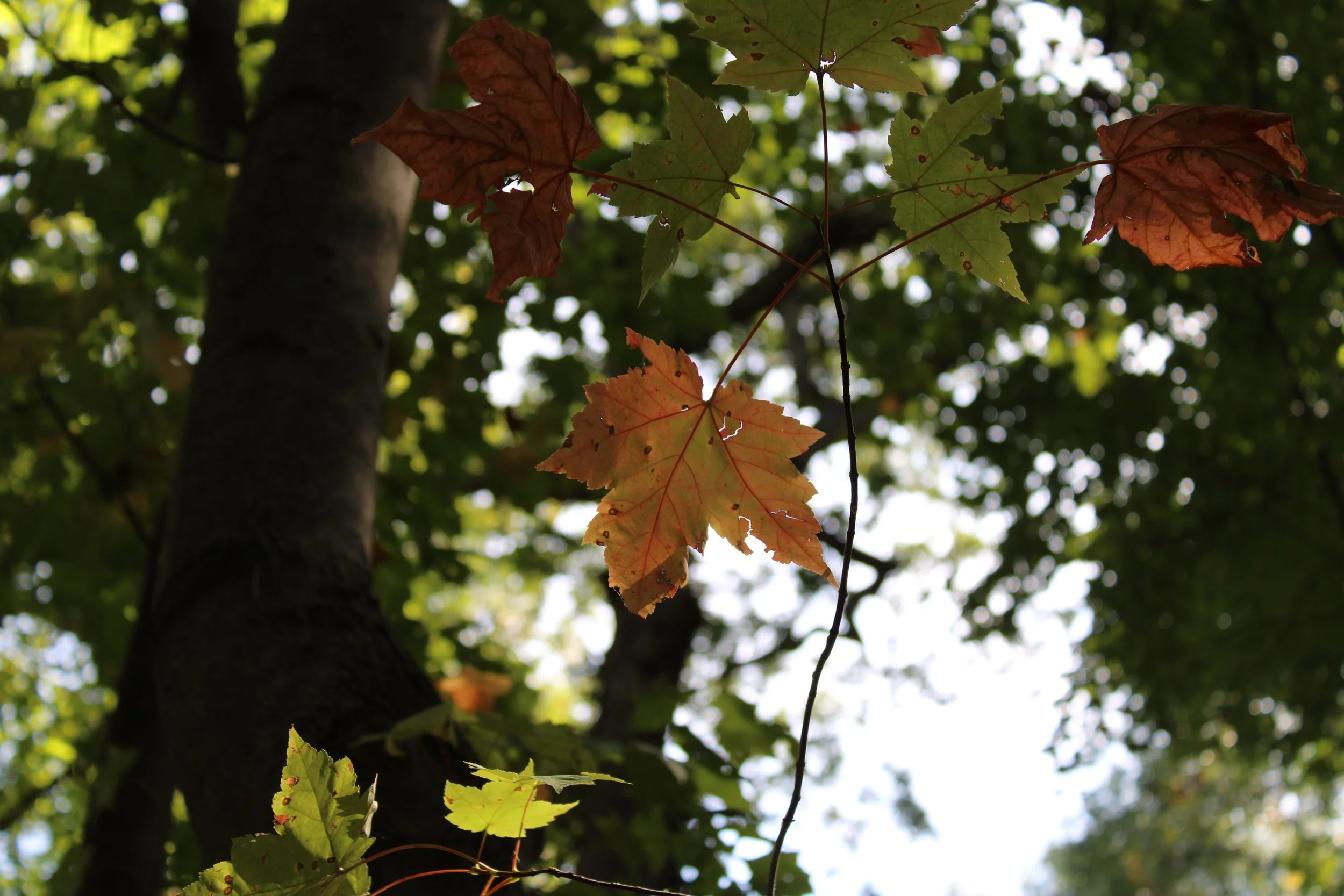"When Evening Comes..."
In this Post you will find:
Light for the Way, Love for the Wayfaring: “When Evening Comes”
Pillars of Carmelite Life: The Liturgy (Part 2) | Praying the Psalms
Construction Update: The Last Shipment of Italian Marble has Arrived!
A Visit From St. Therese
Fall Colors
Please know that we pray for you and your intentions. We are profoundly grateful for your continued support. May God reward you!
The Carmelite Hermits
Light for the Way, Love for the Wayfaring
As Fall continues and Winter begins to announce its arrival, there are many reminders that the year is coming to an end. The seasons of the year teach us about life. The lesson plan assigned to us for today, however, is: life comes to an end, and in the perspective of that end we must evaluate what is most important as evening approaches. Before sounding too somber, we must recall that each day we witness the promise of resurrection with the rising of every new Sun. (The thought of Spring sustains me in the long Minnesota winters. It's not too early to think: "Spring!"). But still the fact remains, at the end of the day evening comes. There is a certain finality for each and every one of us in life. None of us can escape death. We must know too that with death there will be a final examination; what is called our personal judgment.
John of the Cross' statement, above, sheds light on what happens in the twilight. "When evening comes, you will be examined… in love." There are three moments in the instruction of the present saying: 1.) the moment of examen, 2.) the lesson of love, 3.) and that last instance of self- abandonment. There will be a time when we will have to make an account before God as to how we spent the Today of this present life. Secondly, there will be a review of love. And finally, the last moment arrives in which we abandon ourselves forever into the hands of God.
As many of you know, we are neighbors to a Jesuit Retreat Center. Some of the retreatants have commented in the past, especially as they get older, that for them retreat is: "cramming for the final exam." I usually laugh when I hear this because it sounds funny; but there is wisdom to be found in the humor.
Exams are part and parcel of life. Every student knows that at the end of a semester there is a final paper or exam designed to test what has come to be known throughout the school year. These are usually moments of great anxiety. I still remember the timed math tests that I had to take as a first grader… box dividers (to prevent cheating) and all! The panic rises every time I think of a clock ticking away as a project needs to be finished. I am a contemplative, in part, so that I could take on a new perspective no longer living for the clock but living for eternity. Here's the first piece of useful information in today's lesson plan: the human person is not created for time but for eternity. That eternity will be defined by how you live in time. With that in mind we have to ask, "what is a life lived well?"
To answer that question, one has to turn and think about what is most important. How do we evaluate the value of our own lives? Typical standards are set by the mindset of our own culture: educational background, job position, power, influence, money, what we own, where we live, what we wear, who we know, life experience, and in the world of social media how many followers we have! The list could go on… But the question begs itself, are these genuine standards by which the value of a human person is measured? Do we measure the ones we love in this manner? Our spouses, our children, our friends, our neighbors, our communities?
St. Paul provides a clue about the true worth of every man, woman, and child before God:
"If I speak in the tongues of men and of angels, but have not love, I am a noisy gong or a clanging cymbal. And if I have prophetic powers, and understand all mysteries and all knowledge, and if I have all faith, so as to remove mountains, but have not love, I am nothing. If I give away all I have, and if I deliver my body to be burned, but have not love, I gain nothing."
- 1 Cor 13, 1–3
The Apostle is speaking about the more excellent way which we are able to follow as free persons. The human person is at his or her best when they follow the way of love. Learning to love is the most important lesson that we can learn before the eventide of life. The truth is, I am nothing if I do not love. Love is the genuine standard for quality of life. The opposite of this is to make some noise, to move mountains, to know everything, to do everything and be the best for my own sake. Self-love can creep into everything we do and destroy all that we accomplish even if we are doing great things for God, our families, our country, our employers and so on. We must not live for ourselves. God has programmed man and woman for the gift of self. Out of love, then, I must learn to give it all away for the sake of the Other - for God's sake and of all those whom we claim to love. To learn to love means that there has to be a process of unlearning our selfishness in all of its forms. John of Cross explains: "…Learn to love as God desires to be loved and abandon your own ways of acting." That's it! That's the key, self-abandonment - forgetfulness of self!
The course of readings within the liturgical cycle of the Church will begin to focus our attention on the last things (death, judgment, heaven, and hell). Among these texts, one stands out to give us concrete information about the way that God desires to be loved. The text: Mt 25, 31- 46. (Please take the time to read the whole text). It is the parable which concerns the judgment of the nations. The Son of Man comes in his glory with all his angels. From his glorious throne he will sit and judge all peoples of all times. The standard of his judgment will be love! Speaking to those who withstood the final scrutiny, those standing on his right after he separated the sheep from the goats, Jesus the King of Glory speaks his sentence:
"Come, O blessed of my Father, inherit the kingdom prepared for you from the foundation of the world; for I was hungry and you gave me food, I was thirsty and you gave me drink, I was a stranger and you welcomed me, I was naked and you clothed me, I was sick and you visited me, I was in prison and you came to me."
- Mt 25, 35-36
So, the final exam will be in love, or rather in acts of mercy. "The good life" is to be found in our neighbor who is in need. We are called to care for the person of Christ in the persons of the poor. This kind of mercy begins in our own home and in our own communities. The lesson is to learn to love one another because we see Christ in every human being. There are many things we could "do" for God. However, all he wants is for us to love him, the one thing necessary. There is no need to do any more.
One final thought. St. John of the Cross will speak of an essential disposition or attitude which must be acquired at prayer. He names it: "loving attentiveness." This is a spiritual activity by which we go to prayer out of love, setting aside all the other things which demand our attention in order to focus the gaze of our heart on God alone. This means that we unlatch the bonds of love created by desire and affection and reattach the strings of the heart to God. We learn to attend to God in faith and in love in the interior of our souls. Going to prayer is an act of love - a concrete way to love God with our time which is so precious to us. Consider the time in prayer as a necessary prerequisite for running the way of love. In moments of prayer, the reservoir of our hearts is filled. It is how God chooses to pour out his love into our hearts - through the gift of the Spirit. If you want to love, learn to pray within your heart finding in your deepest center a God who loves you more than the whole world itself. The evenings after a busy day are a good time to give to God. If you form this habit of heart, you will not be disappointed. You will learn this final lesson: "When evening comes, you will be examined in love." By this, I intend the gift of contemplation in which you discover with a single glance that God is looking at you… not judging you… but examining you in love!
To practice this loving attentiveness, St. John of the Cross provides his summary of perfection (a cheat sheet for the final exam!):
"Forgetfulness of created things, remembrance of the Creator, attention turned toward inward things, and loving the Beloved."
- The Sum of Perfection
What are we waiting for? We do not need to wait until the Sun sets before we start loving. Open your heart now to God and to those who are around you. Do not be afraid to love. This is what God desires for us and our lifetime on Earth. Teresa of Jesus remarking about death and judgment states that she cannot fear one whom she has loved all her life long. Final judgment is not something to fear if we spend our Today loving his majesty, the King of Glory. The only thing to fear is that you never took the risk to love.
Pillars of Carmelite Life
The Liturgy (Part 2): “Praying the Psalms”
By way of review, as we continue these articles on The Rule of Saint Albert, the pillars of Carmelite life are: sacred reading, work, the liturgy, silence, solitude, self-denial, and unceasing prayer. We will now expand on the topic of the liturgy. It receives special note because, as was mentioned in the last article on the pillars of our life in Carmel, liturgy and its celebration is the sum and summary of Christian life. The Opus Dei (work of God) par excellence is the celebration of the Liturgy of the Hours in the chanting of the Divine Office. Seven times a day the Church gathers throughout the world to sing the praises of God, chanting the Psalms with one voice and one heart. It is the voice of the Bride calling in response to the love of the Bridegroom. The Church fulfills the prophetic exclamation of the Psalmist: "I will sing of your mercies, O LORD, forever; with my mouth I will proclaim your faithfulness to all generations." (Ps 89, 1).
Psalmody: Unceasing PrAYER
"…My soul sings psalms to you unceasingly…" - Ps 30, 13 (Grail Psalter)
Besides thinking of a mountain, when someone hears the word "Carmel" they will usually make associations with the brown habit, asceticism, prayer and contemplation, union with God, St. Teresa of Jesus, St. John of the Cross, and St. Therese. In short, the word "Carmel" elicits thoughts in the mind of everything that has to do with the mystical life. There is another dimension of Carmelite life which should not be overlooked because it is the atmosphere or environment from which all prayer in Carmel is born. I am speaking of the Psalms and the way they are used in the liturgy of the Church. Singing and praying the Psalms is central to the plan of Carmelite religious life. The Rule of St. Albert states the following as a precept:
"Those who know how to say the canonical hours with the clerics shall say them according to the institution of the Holy Fathers and the approved custom of the Church."
In the formula vitae of St. Albert (the primitive form of the Rule) the text is different in some significant respects, for example the precept above is introduced in the following manner:
"Those who know their letters and can read the Psalms…" rather than, "Those who know how to say the canonical hours with the clerics…"
In the first monastic experiment on Mount Carmel, St. Albert of Jerusalem (between 1207 - 1214) legislates for a semi-eremitical form of life, and did not make the praying of the canonical hours a juridical obligation. The formal requirement to pray the Divine Office is defined with the Innocentian reform of the Rule in 1247. The canonical hours, thus, become a definitive element of religious life in common. This change, in fact, reflects the transition towards mendicancy in the late 13th century as the Carmelites migrated from Mount Carmel to Western Europe. The first hermits, on the other hand, would pray the Psalms privately in their cells - it would not be as such, a formal participation in the liturgy of the Church, but a way of prayer learned from the example of the monastic fathers. Most likely, the hermits would pray the Psalter from memory. In the age of early monasticism, one could not make profession until all the Psalms had been memorized!
The text of the formula vitae continues: "…shall say for each of the hours those [Psalms] which are appointed for those hours…" Praying a certain number of Psalms at set hours in the day had always been an established element of monastic life. The Psalms, as mentioned, would be committed to memory, and the desert Fathers would meditate upon a verse of a Psalm outside formal times of prayer as they performed their manual labor. It was a means for remaining steadfast in the solitude of the cell. The praying of Psalms helped the solitary to persevere in continual prayer and to overcome temptation. Life in the desert is very simple and for that reason is susceptible to tedium and boredom. Praying Psalms at intervals helped to break up the monotony of monastic routine. The monk must always be wary of the noonday devil who seeks to discourage the spiritual athlete from persevering in the contest of the desert. For a moment, let us turn our eyes to Anthony the Great:
"When the holy Abba Anthony lived in the desert, he was beset by accidie, and attacked by many sinful thoughts. He said to God, 'Lord, I want to be saved but these thoughts do not leave me alone; what shall I do in my affliction? How can I be saved?' A short while afterwards, when he got up to go out, Anthony saw a man like himself sitting at his work, getting up from his work to pray, then sitting down and plaiting a rope, then getting up again to pray. It was an angel of the Lord sent to correct and reassure him. He heard the angel saying to him, 'Do this and you will be saved.' At these words, Anthony was filled with joy and courage. He did this, and he was saved." (Sayings of the Desert Fathers, Abba Anthony #1, trans. Benedicta Ward, SLG).
Praying the Psalms at intervals was a matter of his eternal salvation. Anthony was getting ready not just to leave his cell, but he intended rather to quit the desert all together. Prayer and work in combination saved his vocation and helped him to persevere in his cell. Work and prayer saved him in the tedium of his solitude. The alternation between prayer and work (what is called "ora et labora" in the monastic milieu) throughout the various moments of the day will eventually become the pattern for all forms of religious life. Praying the Psalms at set times creates structure in a monastic day, providing the basic rudiments of an horarium (hourly schedule). The Psalter is "the monastic prayer book" and the Psalms define a monk's prayer. It is the essential text which records the dialogue that transpires between God and the one praying. Psalmody provides a rhythm, which is supernatural in character, to the ebb and flow of contemplative life.
Elijah, the Psalms and Carmelite Tradition
In an ancient medieval Carmelite text familiarly known as The Ten Books by Felip Ribot (written around 1385), Elijah is set forth as the ideal of the eremitcal monastic life. He is the first to take up this way of life - in solitude, silence, renunciation; but, also in the perpetual singing of God's praises. Accordingly, the Psalter having a prophetic character transforms the singing of the Psalms into a kind of prophesying. Elijah is acting as a prophet when singing the praises of God in inspired song. This prophetic office will be passed on to every son and daughter of Elijah in the Carmelite family.
Elijah will hand over the pattern of the eremitical life to his disciples, who would be called "prophets." Prophecy in this sense is nothing other than singing in praise of God. The first disciples of Elijah would radiate the charism of eremitical monasticism to future generations, and especially to the hermits on Carmel named by the Scriptures as the "sons of the prophets." The spiritual heirs of this charism would then be every Carmelite in every place and time. (Felip Ribot, O. Carm., The Ten Books on the Way of Life and Great Deed of the Carmelites, pgs. 29-32). The role of Carmelite religious in the Church is defined thus by our spiritual fathers. The prophetic role which we play in the Church is the worship of God by praising him in song from our silent retreat on the slopes of Mount Carmel. The following quote from The Ten Books explains:
"…when the Wiseman said to holy Elijah, 'You make prophets to succeed you,' he did not mean that Elijah conferred on his successors the spirit of foreseeing or foretelling the future, but rather, that Elijah established monks as his successors after him not only to observe the monastic life according to the form given him by God but also to perform this office, that is they should prophesy, which is to sing Psalms and songs and hymns devoutly to God, and to praise God not only with their hearts and tongues but also with musical instruments. And therefore, they were called prophets, that is psalm-singers, and their life was called prophetic, that is, dedicated to singing psalms to the Lord with musical instruments. And because they sang such psalms to God and observed the monastic life in the form given to Elijah by God, they obeyed the holy prophet with a ready heart, and thus they merited the blessing of the Wiseman spoken to their father Elijah: 'Blessed are they that heard you, and were honored with your friendship.'" (ibid., pg. 30).
In the mind of medieval Carmelites, prophesying was equivalent with the singing of Psalms in choir. They believed that it was Elijah himself who put into their hands a primitive form of what we now call the Divine Office. The first hermits heard the voice of Elijah echoing in their wadi and they were glad to take up his song of chant and praise to God.
The Importance of Praying the Psalms
"Seven times a day I praise you for your righteous ordinances." - Ps 119, 164
St. Benedict in his Rule states: "Nothing is to be preferred to the work of God…" The opus Dei (Latin for the Work of God) is the liturgy of the Church, which includes the Divine Office; otherwise known as the Liturgy of the Hours. The present precept of the Rule of St. Albert along with what is said elsewhere about the oratory places the praying of the Psalms at the heart of Carmelite religious life. It is an essential pillar in the structure of the spiritual edifice that is being built. The current Constitutions of the Order of Carmel also indicate the importance of Liturgical prayer, especially in the praying of the Hours:
"As religious we are called after the example of the early Church to pray together liturgically in the Eucharist and the Liturgy of the Hours. Liturgical prayer is the highest encounter with God: the community experiences and celebrates God's mystery in communion, and makes it a reality in their lives. Personal prayer is intimately linked with liturgical prayer; one flows from the other." (Constitutions of the Order of the Blessed Virgin Mary of Mount Carmel 2019, #72).
Liturgical prayer is described here as the highest encounter with God and the fountainhead of all personal prayer. The praying of the Psalms and the Eucharistic sacrifice introduces the one who prays into the contemplation of God and his mystery. The Constitutions for the Order of Carmel go on to explain that, "Communal liturgical celebrations are moreover a central characteristic of our Rule." (ibid., #74). Carmelites are obliged by these Constitutions to grow "in love for liturgy and in… concern for its renewal." In this manner, it is hoped that each religious would experience a deepening in the contemplation of God's mystery which is celebrated in the liturgy. (ibid., #74). One cannot underestimate the value of the Liturgy of the Hours. St. Mary Magdalene de' Pazzi taught her sisters: "In comparison with the celebration of the Divine Office in choir any meditation or private prayer whatsoever is of little merit before God." (The Carmelite Directory of the Spiritual Life, p. 436). It is a tremendous privilege to have a place in choir and to participate in the official prayer of the Church. It is the best means for making intercession for all the people entrusted to our prayers.
The Psalms chanted in choir by the religious of Carmel is both a participation in the prayer of Christ and the prayer of the Church. In this song the voice of the Bridegroom is heard as Jesus sings to his Bride, the Church. The voice of the Bride is also heard as she extols her Beloved in song. Thus, the Liturgy of the Hours is a canticle of loving dialogue. Furthermore, it is a public work which is made on behalf of the Church - a work which sanctifies each hour of every day. Time is made holy as the Psalms are prayed. Singing the Psalms in choir is a continuation of the Eucharistic celebration recalling the mystery of redemption and making it present in each moment. The Carmelite Constitutions teach that:
"The public prayer of the Church is the manifestation of our participation in the Church at prayer, which, together with Christ, 'is ceaselessly engaged in praising the Lord and interceding for the salvation of the world.' From its pre-eminence as the public and official prayer of the Church, it is a fruitful source for the spiritual life of those who share in it…'The Liturgy of the Hours extends praise and prayer to the different hours of the day, making present the mysteries of salvation, the prayers of intercession, and the foretaste of heavenly glory which are offered to us in the Eucharistic Mystery.' Together with the Eucharistic celebration, the Liturgy of the Hours unfolds for us continuously throughout the liturgical year the mysteries of the redemption accomplished for us by Our Lord Jesus Christ, so that we may encounter them and thus be filled with the grace of salvation."
St. Albert exhorts all those who are able to say the canonical hours to join in the prayer of the Church because it is so vital for the life and spiritual welfare of the individual, the community, the Church, and all peoples and nations. Praying the Psalms is truly a pillar of Carmelite life. By these prayers, a Carmelite intercedes for the whole world with the voice of Christ and his Church and brings down upon all the grace of salvation.
Construction Update
The last shipment of Italian marble has arrived!
The remainder of the columns, bases, and most importantly the capitals, are now with us on site. This is the first time we have had the privilege to see the fine workmanship and design of these unique capitals. And we want you to see them as well… The capitals were designed by Br. Christopher, the artist in our community. They were then executed in Carrara marble, taken from the same quarries from which Michelangelo procured material for his own famous statues.
The containers all look the same, the contents are the hidden pearl.
A capital which will adorn the top of each column.
HVAC ductwork installation continues.
You may have seen in the background of other photos above, and in the last newsletter, that one of the exterior walls of the chapel has been built to its full length.
Full south exterior wall.
South wall from the inside. Fall colors shining through.
“I feel that my mission is about to begin, my mission of making others love God as I love Him, my mission of teaching my little way to souls. If God answers my requests, my heaven will be spent on earth up until the end of the world. Yes, I want to spend my heaven in doing good on earth.” - St. Therese, Story of a Soul
St. Therese Visits Carmel in Lake Elmo
From October 2nd - 3rd, we had the joy of welcoming the relics of St. Therese of Lisieux and her parents Sts. Louis and Zelie Martin. The relics arrived at the monastery of the Sisters where they were placed on display in their choir. Time for prayer was arranged throughout the day for our communities and for the public. The highlight of the event was a solemn celebration of Mass in honor of St. Therese. Fr. John Mary, the prior of our hermitage, celebrated the Mass and preached on the veneration of the saints and their relics. It was a profound grace to have the Little Flower and her parents so close. Many prayers were entrusted to them. The relics upon leaving the monastery of the Nuns continued on their tour of the Archdiocese of St. Paul and Minneapolis. We are so grateful that Therese and her parents made their first stop in their travels at Carmel!
The reliquary of St. Therese containing her shin bone.
The reliquary containing vertebrae of St. Therese’s parents: St. Louis and St. Zelie Martin.
Fall Colors: A Walk in the Woods
We are still on the path around our field. This trail winds along the South into our woods.
Silver Birches line the outer perimeter of the woods.
The Sun bursts through the dense foliage adding a sense of mystery. The lights and darks of the wood create an atmosphere of prayer and contemplation.
The bark of the Birch trees shines a brilliant white in the Sun.
Their leaves turn a rich golden-yellow.
Sundays are a great day for taking a walk, especially after having done some lectio divina.
This trail heads due South and takes us into the interior of the woods. As you walk you can think about the interior life and go deeper…
Facing East from the trail. In the spiritual life, too, there are many hills and valleys.
The trees are still not at their peak.
This is just a preview.
The contemplative eye never misses any detail. Everything speaks of God’s beauty.
We’ll continue our walk next time. God bless you!
